Effective Communication & Negotiation for Promotion at ABC Insurance
VerifiedAdded on 2023/06/07
|13
|4024
|229
Report
AI Summary
This report explores the application of communication and negotiation skills in the context of securing a promotion at ABC Insurance in the UAE. It covers key aspects such as the negotiation process, understanding BATNA (Best Alternative to a Negotiated Agreement), essential negotiation techniques, setting SMART goals, addressing potential objections from the General Manager, and strategies for making a positive first impression. The report also emphasizes the importance of considering the negotiating partner's benefits, providing feedback, and strategies for achieving effectiveness and efficiency in negotiations. Ultimately, the analysis provides a comprehensive guide for the Dubai branch manager to navigate the promotion negotiation process successfully.
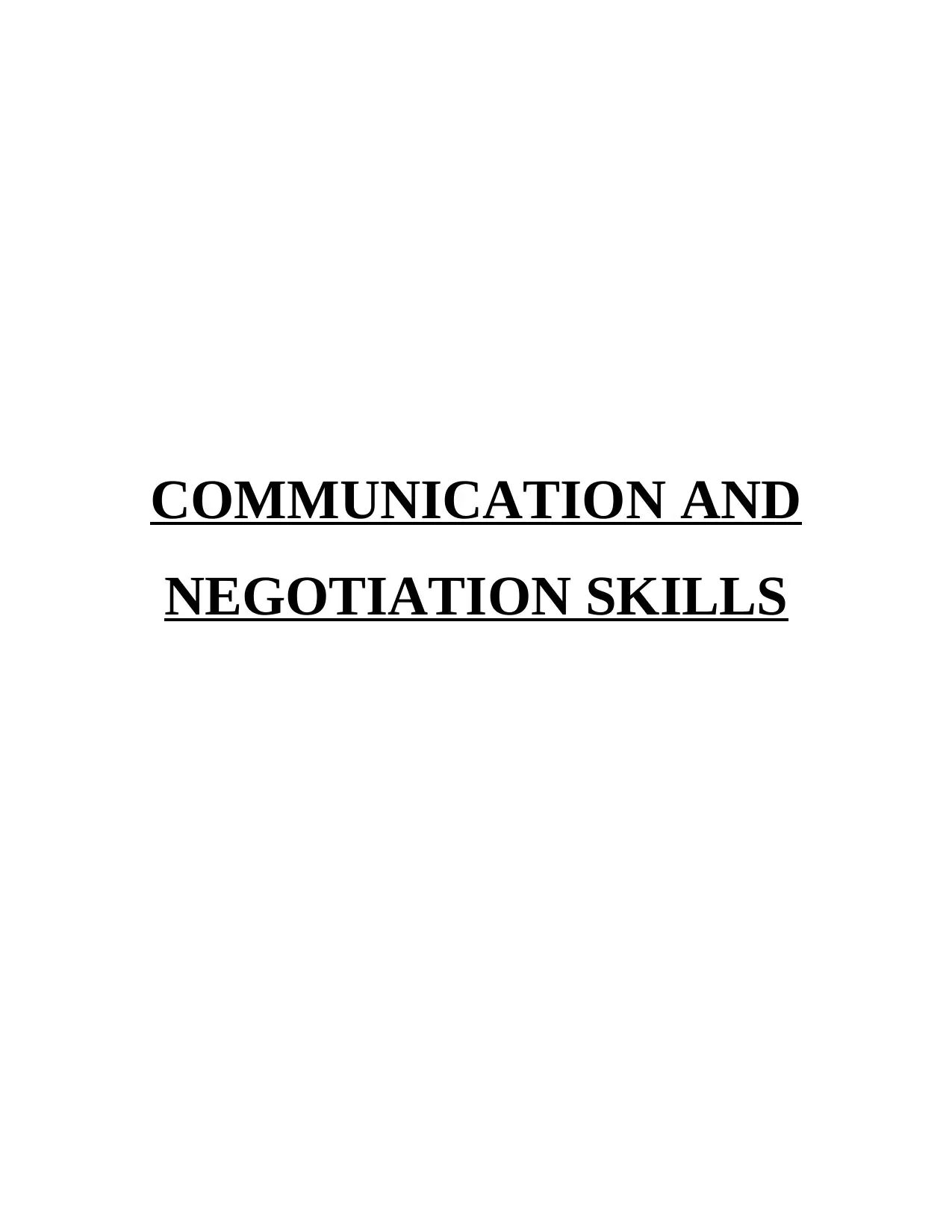
COMMUNICATION AND
NEGOTIATION SKILLS
NEGOTIATION SKILLS
Paraphrase This Document
Need a fresh take? Get an instant paraphrase of this document with our AI Paraphraser
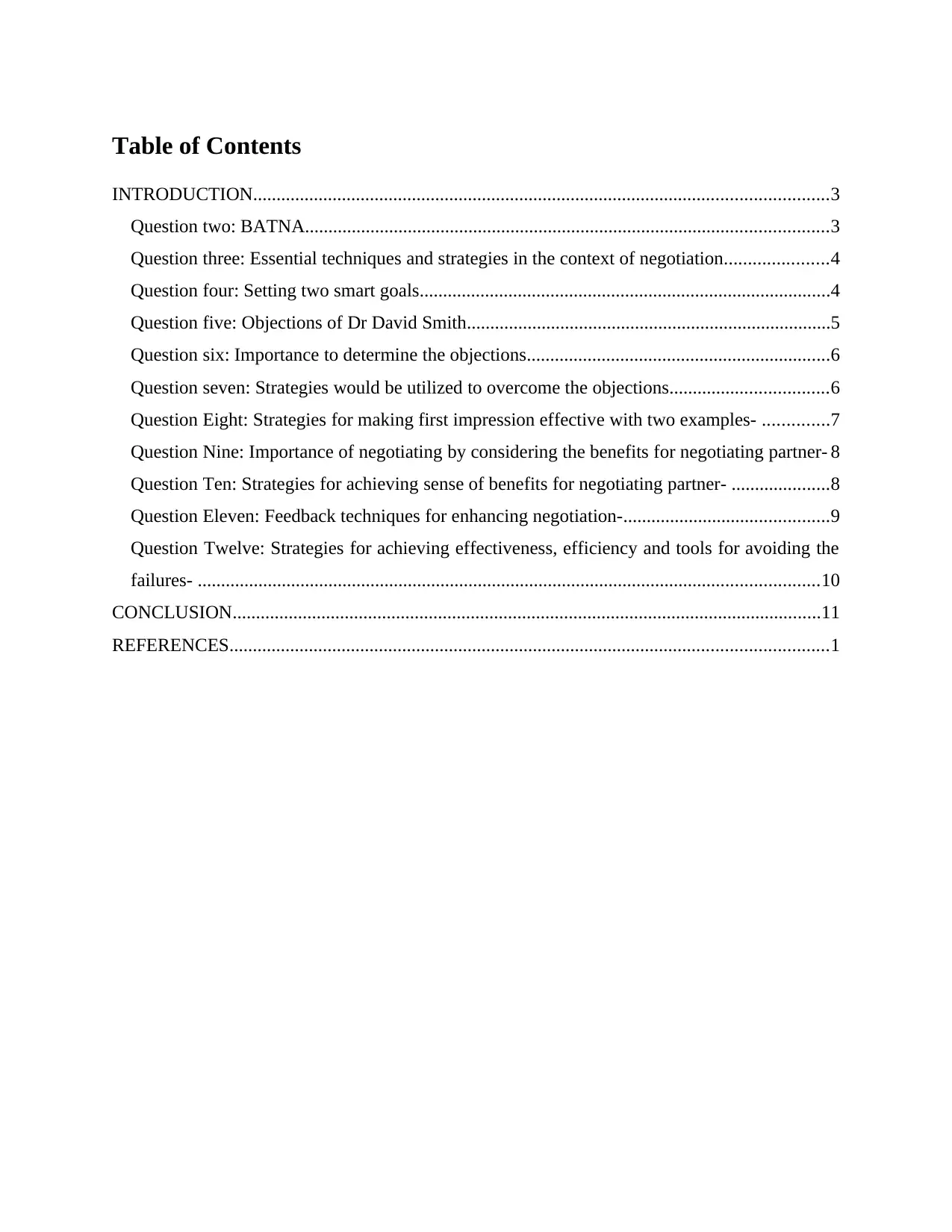
Table of Contents
INTRODUCTION...........................................................................................................................3
Question two: BATNA................................................................................................................3
Question three: Essential techniques and strategies in the context of negotiation......................4
Question four: Setting two smart goals........................................................................................4
Question five: Objections of Dr David Smith..............................................................................5
Question six: Importance to determine the objections.................................................................6
Question seven: Strategies would be utilized to overcome the objections..................................6
Question Eight: Strategies for making first impression effective with two examples- ..............7
Question Nine: Importance of negotiating by considering the benefits for negotiating partner- 8
Question Ten: Strategies for achieving sense of benefits for negotiating partner- .....................8
Question Eleven: Feedback techniques for enhancing negotiation-............................................9
Question Twelve: Strategies for achieving effectiveness, efficiency and tools for avoiding the
failures- .....................................................................................................................................10
CONCLUSION..............................................................................................................................11
REFERENCES................................................................................................................................1
INTRODUCTION...........................................................................................................................3
Question two: BATNA................................................................................................................3
Question three: Essential techniques and strategies in the context of negotiation......................4
Question four: Setting two smart goals........................................................................................4
Question five: Objections of Dr David Smith..............................................................................5
Question six: Importance to determine the objections.................................................................6
Question seven: Strategies would be utilized to overcome the objections..................................6
Question Eight: Strategies for making first impression effective with two examples- ..............7
Question Nine: Importance of negotiating by considering the benefits for negotiating partner- 8
Question Ten: Strategies for achieving sense of benefits for negotiating partner- .....................8
Question Eleven: Feedback techniques for enhancing negotiation-............................................9
Question Twelve: Strategies for achieving effectiveness, efficiency and tools for avoiding the
failures- .....................................................................................................................................10
CONCLUSION..............................................................................................................................11
REFERENCES................................................................................................................................1
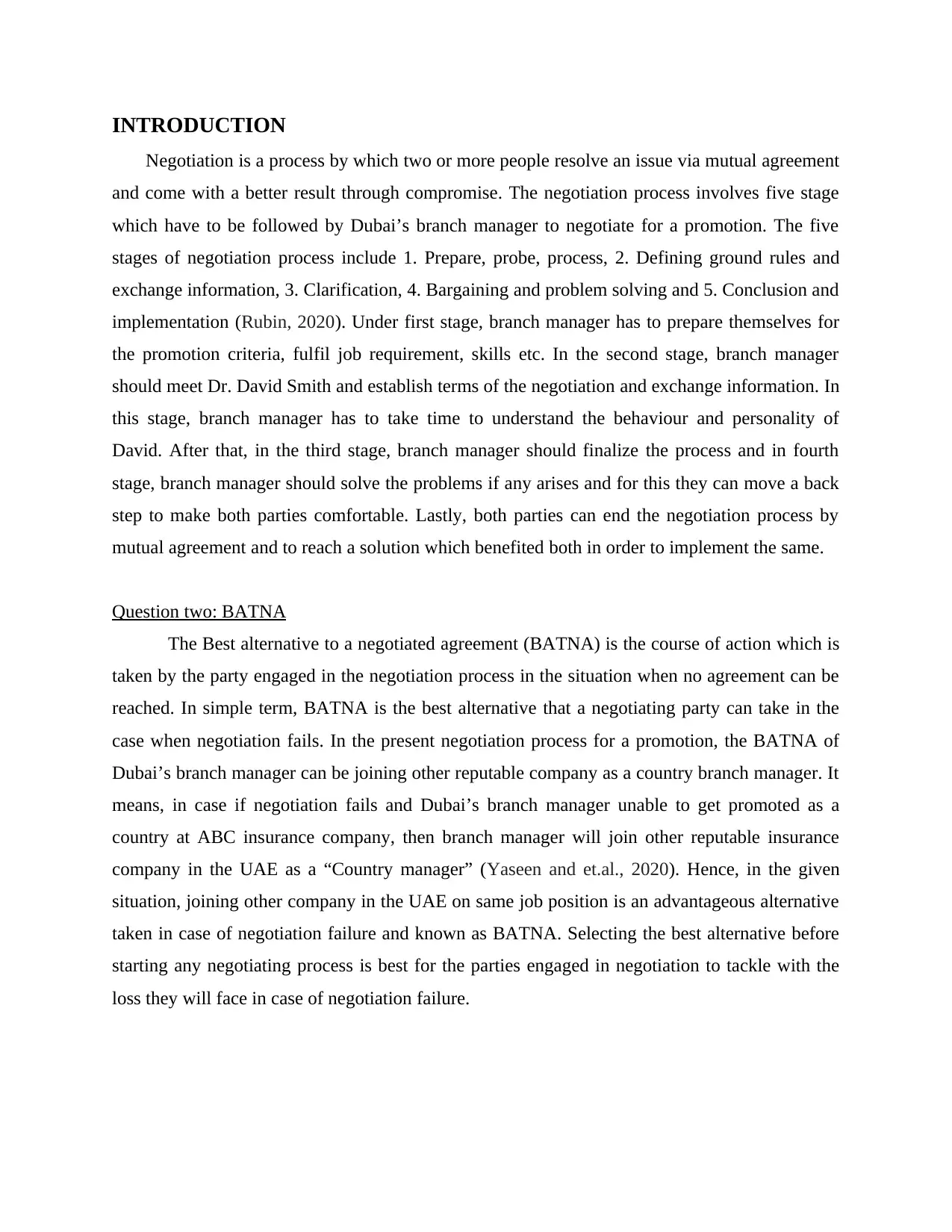
INTRODUCTION
Negotiation is a process by which two or more people resolve an issue via mutual agreement
and come with a better result through compromise. The negotiation process involves five stage
which have to be followed by Dubai’s branch manager to negotiate for a promotion. The five
stages of negotiation process include 1. Prepare, probe, process, 2. Defining ground rules and
exchange information, 3. Clarification, 4. Bargaining and problem solving and 5. Conclusion and
implementation (Rubin, 2020). Under first stage, branch manager has to prepare themselves for
the promotion criteria, fulfil job requirement, skills etc. In the second stage, branch manager
should meet Dr. David Smith and establish terms of the negotiation and exchange information. In
this stage, branch manager has to take time to understand the behaviour and personality of
David. After that, in the third stage, branch manager should finalize the process and in fourth
stage, branch manager should solve the problems if any arises and for this they can move a back
step to make both parties comfortable. Lastly, both parties can end the negotiation process by
mutual agreement and to reach a solution which benefited both in order to implement the same.
Question two: BATNA
The Best alternative to a negotiated agreement (BATNA) is the course of action which is
taken by the party engaged in the negotiation process in the situation when no agreement can be
reached. In simple term, BATNA is the best alternative that a negotiating party can take in the
case when negotiation fails. In the present negotiation process for a promotion, the BATNA of
Dubai’s branch manager can be joining other reputable company as a country branch manager. It
means, in case if negotiation fails and Dubai’s branch manager unable to get promoted as a
country at ABC insurance company, then branch manager will join other reputable insurance
company in the UAE as a “Country manager” (Yaseen and et.al., 2020). Hence, in the given
situation, joining other company in the UAE on same job position is an advantageous alternative
taken in case of negotiation failure and known as BATNA. Selecting the best alternative before
starting any negotiating process is best for the parties engaged in negotiation to tackle with the
loss they will face in case of negotiation failure.
Negotiation is a process by which two or more people resolve an issue via mutual agreement
and come with a better result through compromise. The negotiation process involves five stage
which have to be followed by Dubai’s branch manager to negotiate for a promotion. The five
stages of negotiation process include 1. Prepare, probe, process, 2. Defining ground rules and
exchange information, 3. Clarification, 4. Bargaining and problem solving and 5. Conclusion and
implementation (Rubin, 2020). Under first stage, branch manager has to prepare themselves for
the promotion criteria, fulfil job requirement, skills etc. In the second stage, branch manager
should meet Dr. David Smith and establish terms of the negotiation and exchange information. In
this stage, branch manager has to take time to understand the behaviour and personality of
David. After that, in the third stage, branch manager should finalize the process and in fourth
stage, branch manager should solve the problems if any arises and for this they can move a back
step to make both parties comfortable. Lastly, both parties can end the negotiation process by
mutual agreement and to reach a solution which benefited both in order to implement the same.
Question two: BATNA
The Best alternative to a negotiated agreement (BATNA) is the course of action which is
taken by the party engaged in the negotiation process in the situation when no agreement can be
reached. In simple term, BATNA is the best alternative that a negotiating party can take in the
case when negotiation fails. In the present negotiation process for a promotion, the BATNA of
Dubai’s branch manager can be joining other reputable company as a country branch manager. It
means, in case if negotiation fails and Dubai’s branch manager unable to get promoted as a
country at ABC insurance company, then branch manager will join other reputable insurance
company in the UAE as a “Country manager” (Yaseen and et.al., 2020). Hence, in the given
situation, joining other company in the UAE on same job position is an advantageous alternative
taken in case of negotiation failure and known as BATNA. Selecting the best alternative before
starting any negotiating process is best for the parties engaged in negotiation to tackle with the
loss they will face in case of negotiation failure.
⊘ This is a preview!⊘
Do you want full access?
Subscribe today to unlock all pages.

Trusted by 1+ million students worldwide
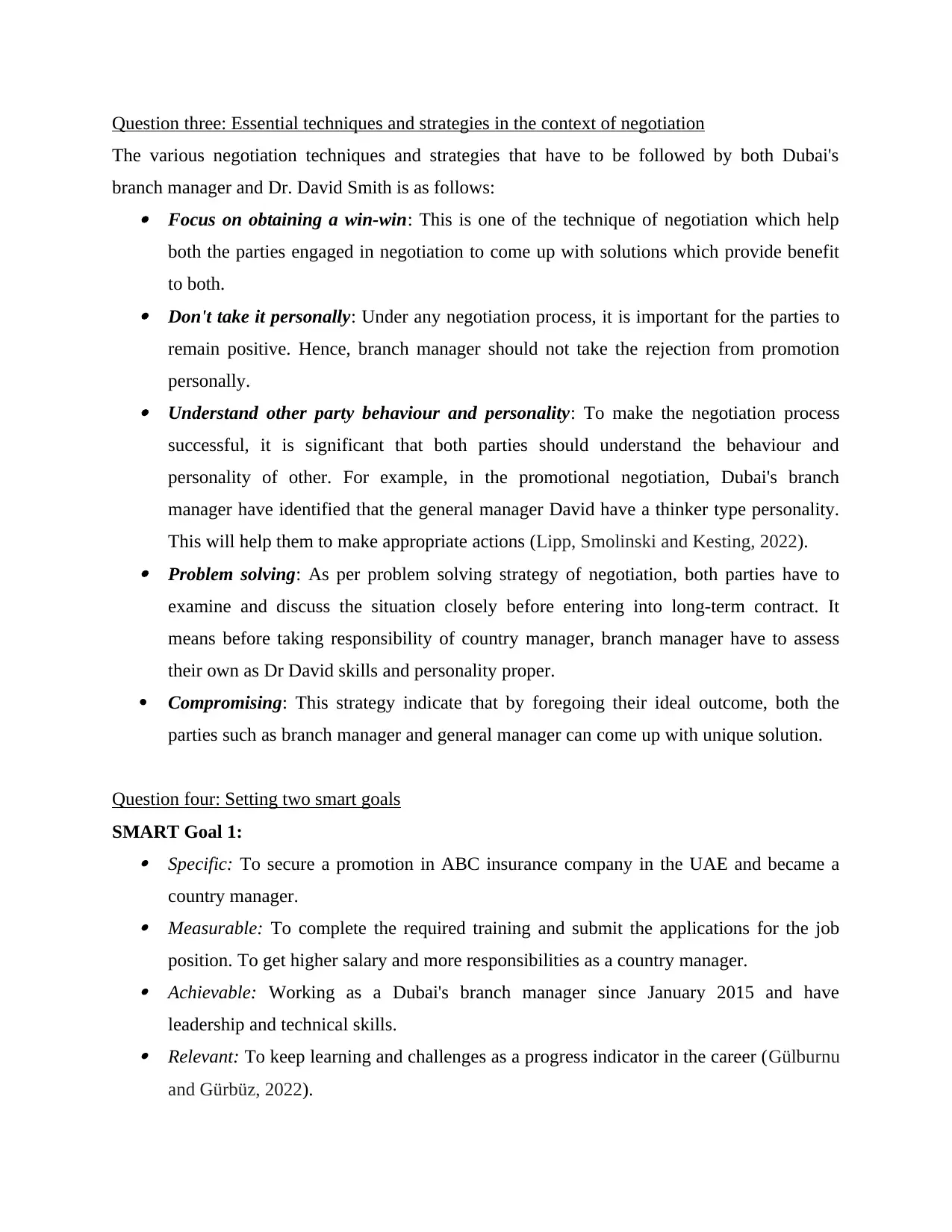
Question three: Essential techniques and strategies in the context of negotiation
The various negotiation techniques and strategies that have to be followed by both Dubai's
branch manager and Dr. David Smith is as follows: Focus on obtaining a win-win: This is one of the technique of negotiation which help
both the parties engaged in negotiation to come up with solutions which provide benefit
to both. Don't take it personally: Under any negotiation process, it is important for the parties to
remain positive. Hence, branch manager should not take the rejection from promotion
personally. Understand other party behaviour and personality: To make the negotiation process
successful, it is significant that both parties should understand the behaviour and
personality of other. For example, in the promotional negotiation, Dubai's branch
manager have identified that the general manager David have a thinker type personality.
This will help them to make appropriate actions (Lipp, Smolinski and Kesting, 2022). Problem solving: As per problem solving strategy of negotiation, both parties have to
examine and discuss the situation closely before entering into long-term contract. It
means before taking responsibility of country manager, branch manager have to assess
their own as Dr David skills and personality proper.
Compromising: This strategy indicate that by foregoing their ideal outcome, both the
parties such as branch manager and general manager can come up with unique solution.
Question four: Setting two smart goals
SMART Goal 1: Specific: To secure a promotion in ABC insurance company in the UAE and became a
country manager. Measurable: To complete the required training and submit the applications for the job
position. To get higher salary and more responsibilities as a country manager. Achievable: Working as a Dubai's branch manager since January 2015 and have
leadership and technical skills. Relevant: To keep learning and challenges as a progress indicator in the career (Gülburnu
and Gürbüz, 2022).
The various negotiation techniques and strategies that have to be followed by both Dubai's
branch manager and Dr. David Smith is as follows: Focus on obtaining a win-win: This is one of the technique of negotiation which help
both the parties engaged in negotiation to come up with solutions which provide benefit
to both. Don't take it personally: Under any negotiation process, it is important for the parties to
remain positive. Hence, branch manager should not take the rejection from promotion
personally. Understand other party behaviour and personality: To make the negotiation process
successful, it is significant that both parties should understand the behaviour and
personality of other. For example, in the promotional negotiation, Dubai's branch
manager have identified that the general manager David have a thinker type personality.
This will help them to make appropriate actions (Lipp, Smolinski and Kesting, 2022). Problem solving: As per problem solving strategy of negotiation, both parties have to
examine and discuss the situation closely before entering into long-term contract. It
means before taking responsibility of country manager, branch manager have to assess
their own as Dr David skills and personality proper.
Compromising: This strategy indicate that by foregoing their ideal outcome, both the
parties such as branch manager and general manager can come up with unique solution.
Question four: Setting two smart goals
SMART Goal 1: Specific: To secure a promotion in ABC insurance company in the UAE and became a
country manager. Measurable: To complete the required training and submit the applications for the job
position. To get higher salary and more responsibilities as a country manager. Achievable: Working as a Dubai's branch manager since January 2015 and have
leadership and technical skills. Relevant: To keep learning and challenges as a progress indicator in the career (Gülburnu
and Gürbüz, 2022).
Paraphrase This Document
Need a fresh take? Get an instant paraphrase of this document with our AI Paraphraser
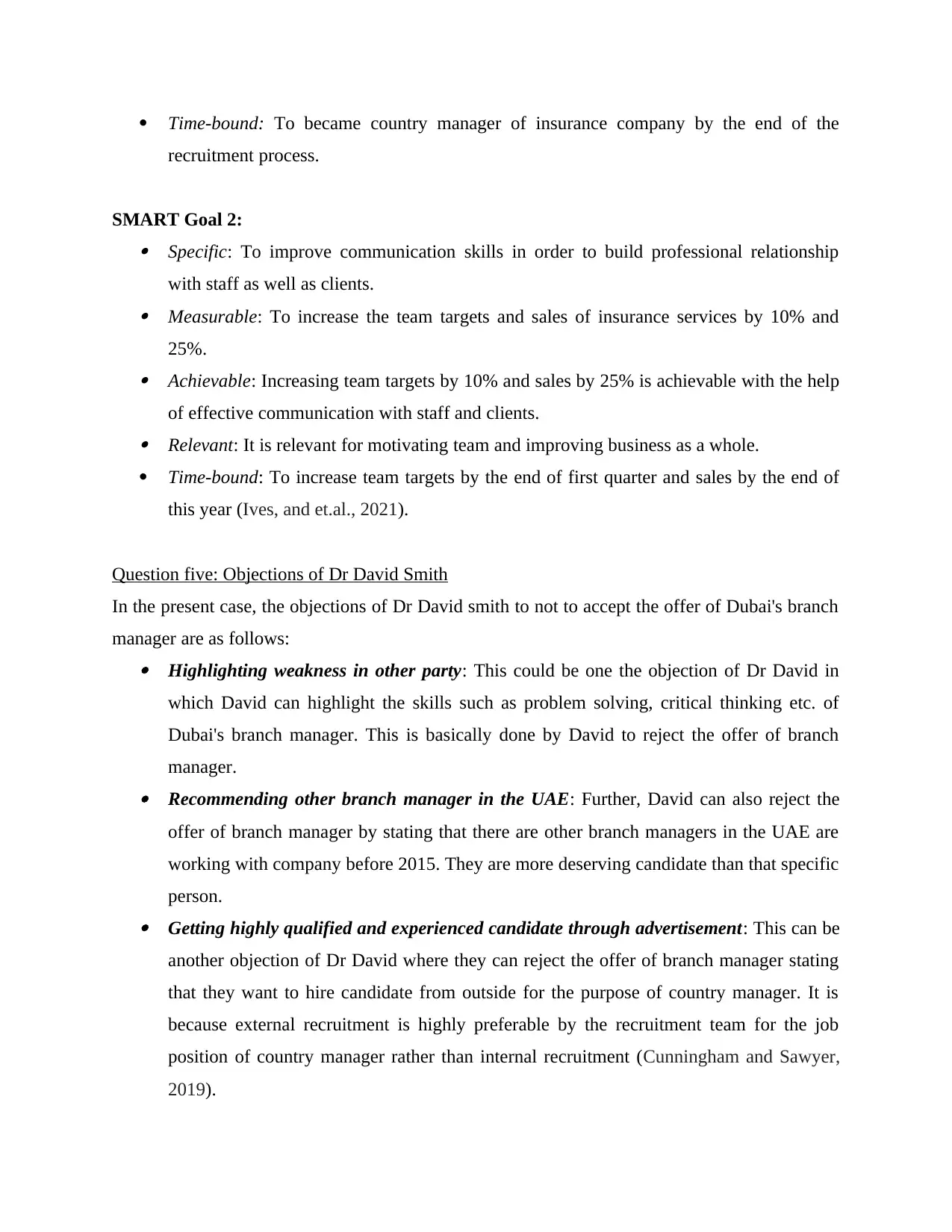
Time-bound: To became country manager of insurance company by the end of the
recruitment process.
SMART Goal 2: Specific: To improve communication skills in order to build professional relationship
with staff as well as clients. Measurable: To increase the team targets and sales of insurance services by 10% and
25%. Achievable: Increasing team targets by 10% and sales by 25% is achievable with the help
of effective communication with staff and clients. Relevant: It is relevant for motivating team and improving business as a whole.
Time-bound: To increase team targets by the end of first quarter and sales by the end of
this year (Ives, and et.al., 2021).
Question five: Objections of Dr David Smith
In the present case, the objections of Dr David smith to not to accept the offer of Dubai's branch
manager are as follows: Highlighting weakness in other party: This could be one the objection of Dr David in
which David can highlight the skills such as problem solving, critical thinking etc. of
Dubai's branch manager. This is basically done by David to reject the offer of branch
manager. Recommending other branch manager in the UAE: Further, David can also reject the
offer of branch manager by stating that there are other branch managers in the UAE are
working with company before 2015. They are more deserving candidate than that specific
person. Getting highly qualified and experienced candidate through advertisement: This can be
another objection of Dr David where they can reject the offer of branch manager stating
that they want to hire candidate from outside for the purpose of country manager. It is
because external recruitment is highly preferable by the recruitment team for the job
position of country manager rather than internal recruitment (Cunningham and Sawyer,
2019).
recruitment process.
SMART Goal 2: Specific: To improve communication skills in order to build professional relationship
with staff as well as clients. Measurable: To increase the team targets and sales of insurance services by 10% and
25%. Achievable: Increasing team targets by 10% and sales by 25% is achievable with the help
of effective communication with staff and clients. Relevant: It is relevant for motivating team and improving business as a whole.
Time-bound: To increase team targets by the end of first quarter and sales by the end of
this year (Ives, and et.al., 2021).
Question five: Objections of Dr David Smith
In the present case, the objections of Dr David smith to not to accept the offer of Dubai's branch
manager are as follows: Highlighting weakness in other party: This could be one the objection of Dr David in
which David can highlight the skills such as problem solving, critical thinking etc. of
Dubai's branch manager. This is basically done by David to reject the offer of branch
manager. Recommending other branch manager in the UAE: Further, David can also reject the
offer of branch manager by stating that there are other branch managers in the UAE are
working with company before 2015. They are more deserving candidate than that specific
person. Getting highly qualified and experienced candidate through advertisement: This can be
another objection of Dr David where they can reject the offer of branch manager stating
that they want to hire candidate from outside for the purpose of country manager. It is
because external recruitment is highly preferable by the recruitment team for the job
position of country manager rather than internal recruitment (Cunningham and Sawyer,
2019).
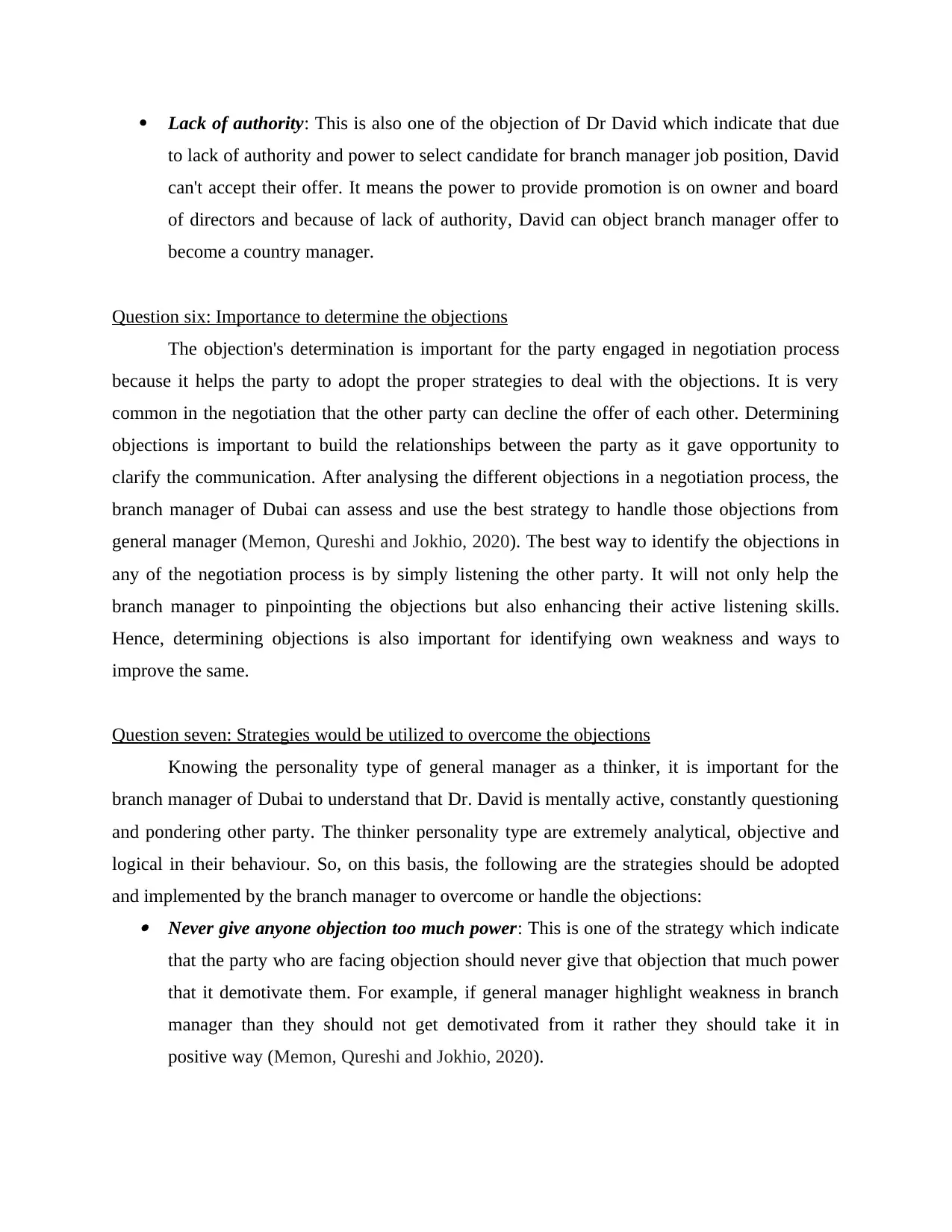
Lack of authority: This is also one of the objection of Dr David which indicate that due
to lack of authority and power to select candidate for branch manager job position, David
can't accept their offer. It means the power to provide promotion is on owner and board
of directors and because of lack of authority, David can object branch manager offer to
become a country manager.
Question six: Importance to determine the objections
The objection's determination is important for the party engaged in negotiation process
because it helps the party to adopt the proper strategies to deal with the objections. It is very
common in the negotiation that the other party can decline the offer of each other. Determining
objections is important to build the relationships between the party as it gave opportunity to
clarify the communication. After analysing the different objections in a negotiation process, the
branch manager of Dubai can assess and use the best strategy to handle those objections from
general manager (Memon, Qureshi and Jokhio, 2020). The best way to identify the objections in
any of the negotiation process is by simply listening the other party. It will not only help the
branch manager to pinpointing the objections but also enhancing their active listening skills.
Hence, determining objections is also important for identifying own weakness and ways to
improve the same.
Question seven: Strategies would be utilized to overcome the objections
Knowing the personality type of general manager as a thinker, it is important for the
branch manager of Dubai to understand that Dr. David is mentally active, constantly questioning
and pondering other party. The thinker personality type are extremely analytical, objective and
logical in their behaviour. So, on this basis, the following are the strategies should be adopted
and implemented by the branch manager to overcome or handle the objections: Never give anyone objection too much power: This is one of the strategy which indicate
that the party who are facing objection should never give that objection that much power
that it demotivate them. For example, if general manager highlight weakness in branch
manager than they should not get demotivated from it rather they should take it in
positive way (Memon, Qureshi and Jokhio, 2020).
to lack of authority and power to select candidate for branch manager job position, David
can't accept their offer. It means the power to provide promotion is on owner and board
of directors and because of lack of authority, David can object branch manager offer to
become a country manager.
Question six: Importance to determine the objections
The objection's determination is important for the party engaged in negotiation process
because it helps the party to adopt the proper strategies to deal with the objections. It is very
common in the negotiation that the other party can decline the offer of each other. Determining
objections is important to build the relationships between the party as it gave opportunity to
clarify the communication. After analysing the different objections in a negotiation process, the
branch manager of Dubai can assess and use the best strategy to handle those objections from
general manager (Memon, Qureshi and Jokhio, 2020). The best way to identify the objections in
any of the negotiation process is by simply listening the other party. It will not only help the
branch manager to pinpointing the objections but also enhancing their active listening skills.
Hence, determining objections is also important for identifying own weakness and ways to
improve the same.
Question seven: Strategies would be utilized to overcome the objections
Knowing the personality type of general manager as a thinker, it is important for the
branch manager of Dubai to understand that Dr. David is mentally active, constantly questioning
and pondering other party. The thinker personality type are extremely analytical, objective and
logical in their behaviour. So, on this basis, the following are the strategies should be adopted
and implemented by the branch manager to overcome or handle the objections: Never give anyone objection too much power: This is one of the strategy which indicate
that the party who are facing objection should never give that objection that much power
that it demotivate them. For example, if general manager highlight weakness in branch
manager than they should not get demotivated from it rather they should take it in
positive way (Memon, Qureshi and Jokhio, 2020).
⊘ This is a preview!⊘
Do you want full access?
Subscribe today to unlock all pages.

Trusted by 1+ million students worldwide
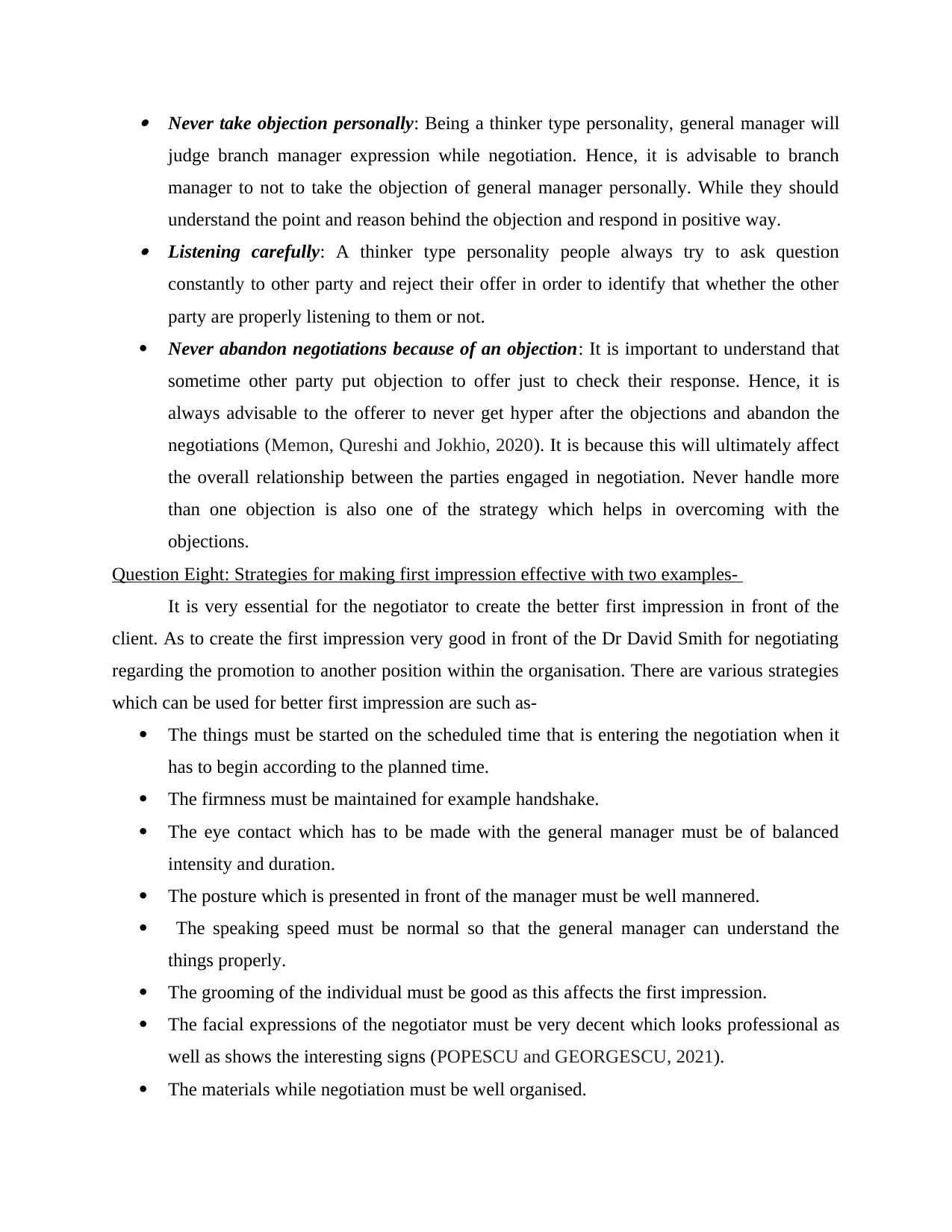
Never take objection personally: Being a thinker type personality, general manager will
judge branch manager expression while negotiation. Hence, it is advisable to branch
manager to not to take the objection of general manager personally. While they should
understand the point and reason behind the objection and respond in positive way. Listening carefully: A thinker type personality people always try to ask question
constantly to other party and reject their offer in order to identify that whether the other
party are properly listening to them or not.
Never abandon negotiations because of an objection: It is important to understand that
sometime other party put objection to offer just to check their response. Hence, it is
always advisable to the offerer to never get hyper after the objections and abandon the
negotiations (Memon, Qureshi and Jokhio, 2020). It is because this will ultimately affect
the overall relationship between the parties engaged in negotiation. Never handle more
than one objection is also one of the strategy which helps in overcoming with the
objections.
Question Eight: Strategies for making first impression effective with two examples-
It is very essential for the negotiator to create the better first impression in front of the
client. As to create the first impression very good in front of the Dr David Smith for negotiating
regarding the promotion to another position within the organisation. There are various strategies
which can be used for better first impression are such as-
The things must be started on the scheduled time that is entering the negotiation when it
has to begin according to the planned time.
The firmness must be maintained for example handshake.
The eye contact which has to be made with the general manager must be of balanced
intensity and duration.
The posture which is presented in front of the manager must be well mannered.
The speaking speed must be normal so that the general manager can understand the
things properly.
The grooming of the individual must be good as this affects the first impression.
The facial expressions of the negotiator must be very decent which looks professional as
well as shows the interesting signs (POPESCU and GEORGESCU, 2021).
The materials while negotiation must be well organised.
judge branch manager expression while negotiation. Hence, it is advisable to branch
manager to not to take the objection of general manager personally. While they should
understand the point and reason behind the objection and respond in positive way. Listening carefully: A thinker type personality people always try to ask question
constantly to other party and reject their offer in order to identify that whether the other
party are properly listening to them or not.
Never abandon negotiations because of an objection: It is important to understand that
sometime other party put objection to offer just to check their response. Hence, it is
always advisable to the offerer to never get hyper after the objections and abandon the
negotiations (Memon, Qureshi and Jokhio, 2020). It is because this will ultimately affect
the overall relationship between the parties engaged in negotiation. Never handle more
than one objection is also one of the strategy which helps in overcoming with the
objections.
Question Eight: Strategies for making first impression effective with two examples-
It is very essential for the negotiator to create the better first impression in front of the
client. As to create the first impression very good in front of the Dr David Smith for negotiating
regarding the promotion to another position within the organisation. There are various strategies
which can be used for better first impression are such as-
The things must be started on the scheduled time that is entering the negotiation when it
has to begin according to the planned time.
The firmness must be maintained for example handshake.
The eye contact which has to be made with the general manager must be of balanced
intensity and duration.
The posture which is presented in front of the manager must be well mannered.
The speaking speed must be normal so that the general manager can understand the
things properly.
The grooming of the individual must be good as this affects the first impression.
The facial expressions of the negotiator must be very decent which looks professional as
well as shows the interesting signs (POPESCU and GEORGESCU, 2021).
The materials while negotiation must be well organised.
Paraphrase This Document
Need a fresh take? Get an instant paraphrase of this document with our AI Paraphraser
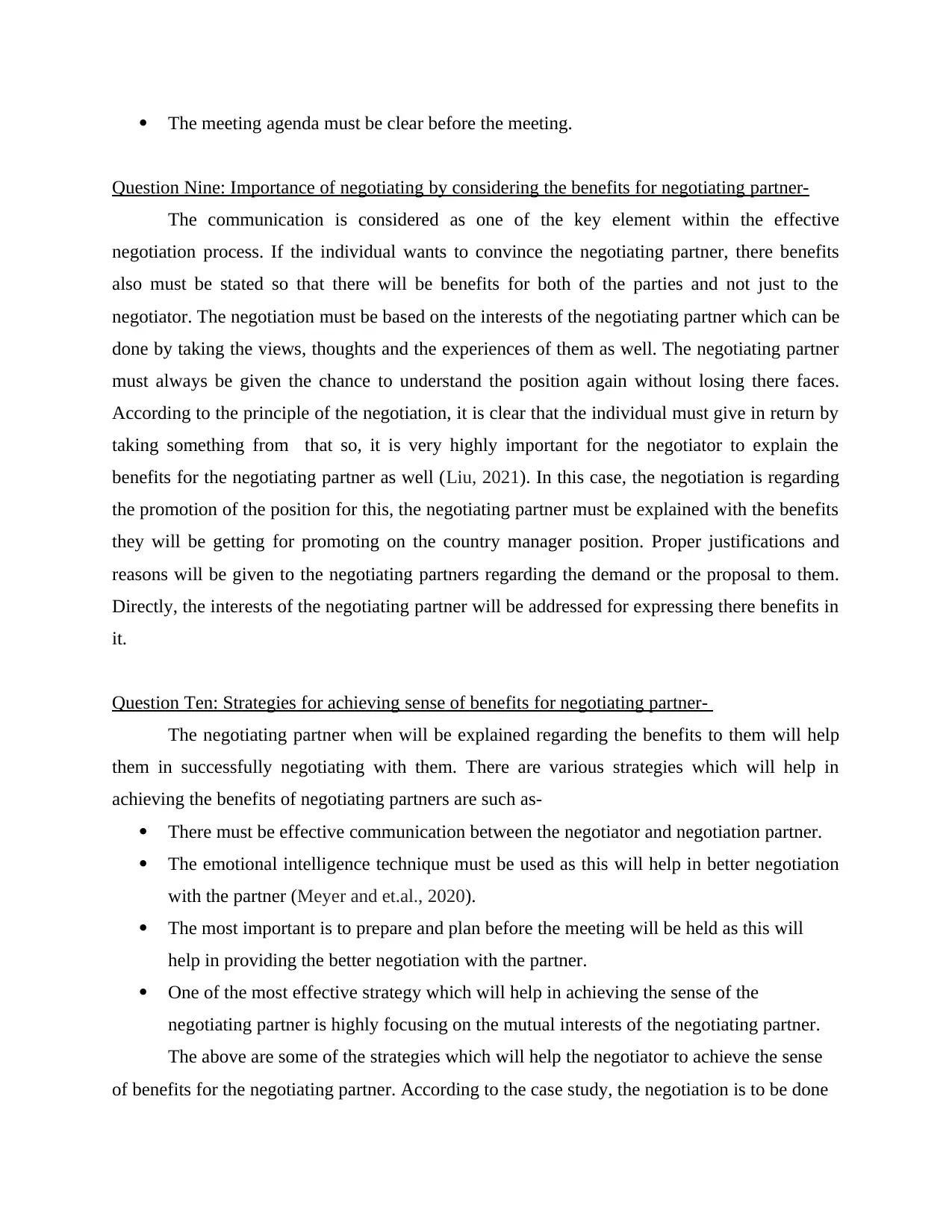
The meeting agenda must be clear before the meeting.
Question Nine: Importance of negotiating by considering the benefits for negotiating partner-
The communication is considered as one of the key element within the effective
negotiation process. If the individual wants to convince the negotiating partner, there benefits
also must be stated so that there will be benefits for both of the parties and not just to the
negotiator. The negotiation must be based on the interests of the negotiating partner which can be
done by taking the views, thoughts and the experiences of them as well. The negotiating partner
must always be given the chance to understand the position again without losing there faces.
According to the principle of the negotiation, it is clear that the individual must give in return by
taking something from that so, it is very highly important for the negotiator to explain the
benefits for the negotiating partner as well (Liu, 2021). In this case, the negotiation is regarding
the promotion of the position for this, the negotiating partner must be explained with the benefits
they will be getting for promoting on the country manager position. Proper justifications and
reasons will be given to the negotiating partners regarding the demand or the proposal to them.
Directly, the interests of the negotiating partner will be addressed for expressing there benefits in
it.
Question Ten: Strategies for achieving sense of benefits for negotiating partner-
The negotiating partner when will be explained regarding the benefits to them will help
them in successfully negotiating with them. There are various strategies which will help in
achieving the benefits of negotiating partners are such as-
There must be effective communication between the negotiator and negotiation partner.
The emotional intelligence technique must be used as this will help in better negotiation
with the partner (Meyer and et.al., 2020).
The most important is to prepare and plan before the meeting will be held as this will
help in providing the better negotiation with the partner.
One of the most effective strategy which will help in achieving the sense of the
negotiating partner is highly focusing on the mutual interests of the negotiating partner.
The above are some of the strategies which will help the negotiator to achieve the sense
of benefits for the negotiating partner. According to the case study, the negotiation is to be done
Question Nine: Importance of negotiating by considering the benefits for negotiating partner-
The communication is considered as one of the key element within the effective
negotiation process. If the individual wants to convince the negotiating partner, there benefits
also must be stated so that there will be benefits for both of the parties and not just to the
negotiator. The negotiation must be based on the interests of the negotiating partner which can be
done by taking the views, thoughts and the experiences of them as well. The negotiating partner
must always be given the chance to understand the position again without losing there faces.
According to the principle of the negotiation, it is clear that the individual must give in return by
taking something from that so, it is very highly important for the negotiator to explain the
benefits for the negotiating partner as well (Liu, 2021). In this case, the negotiation is regarding
the promotion of the position for this, the negotiating partner must be explained with the benefits
they will be getting for promoting on the country manager position. Proper justifications and
reasons will be given to the negotiating partners regarding the demand or the proposal to them.
Directly, the interests of the negotiating partner will be addressed for expressing there benefits in
it.
Question Ten: Strategies for achieving sense of benefits for negotiating partner-
The negotiating partner when will be explained regarding the benefits to them will help
them in successfully negotiating with them. There are various strategies which will help in
achieving the benefits of negotiating partners are such as-
There must be effective communication between the negotiator and negotiation partner.
The emotional intelligence technique must be used as this will help in better negotiation
with the partner (Meyer and et.al., 2020).
The most important is to prepare and plan before the meeting will be held as this will
help in providing the better negotiation with the partner.
One of the most effective strategy which will help in achieving the sense of the
negotiating partner is highly focusing on the mutual interests of the negotiating partner.
The above are some of the strategies which will help the negotiator to achieve the sense
of benefits for the negotiating partner. According to the case study, the negotiation is to be done
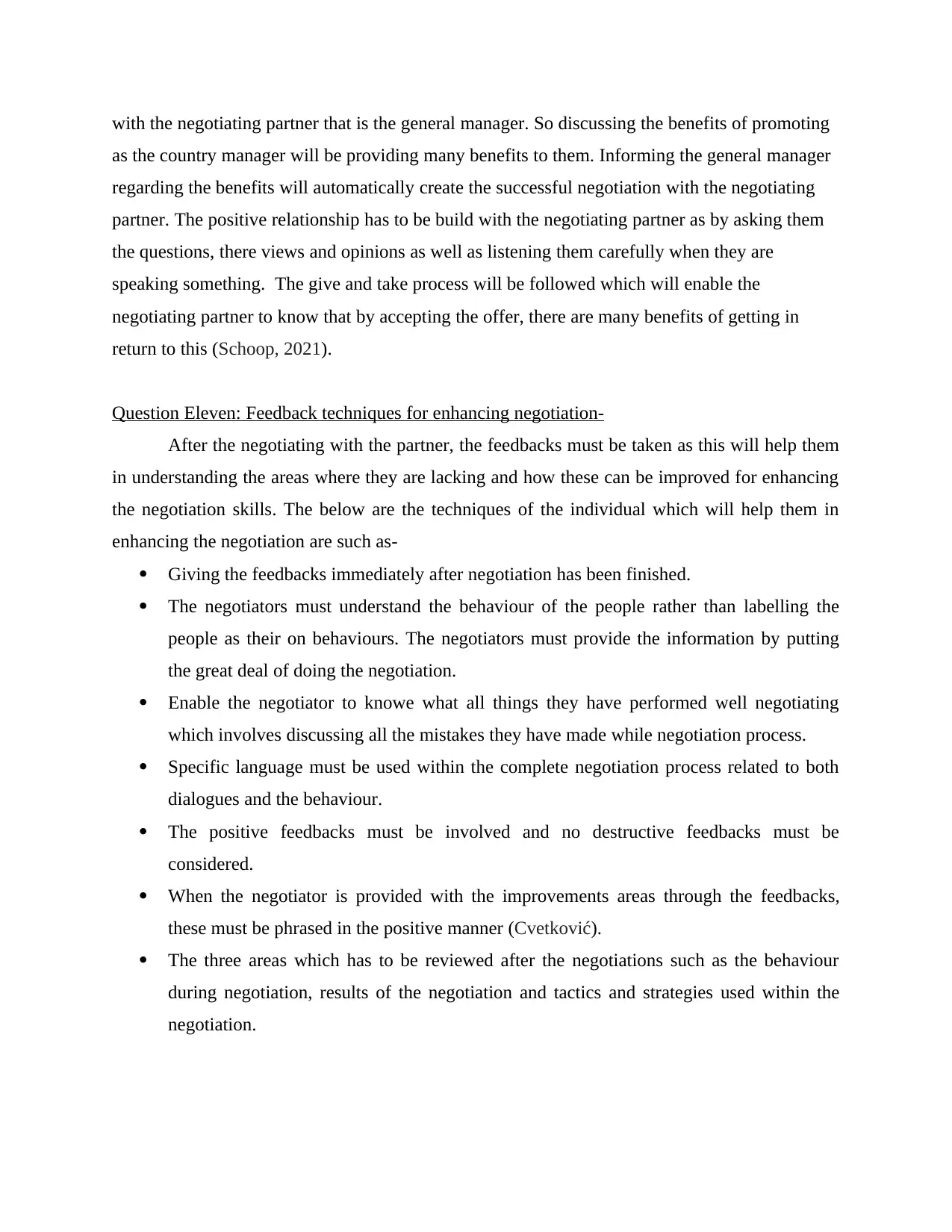
with the negotiating partner that is the general manager. So discussing the benefits of promoting
as the country manager will be providing many benefits to them. Informing the general manager
regarding the benefits will automatically create the successful negotiation with the negotiating
partner. The positive relationship has to be build with the negotiating partner as by asking them
the questions, there views and opinions as well as listening them carefully when they are
speaking something. The give and take process will be followed which will enable the
negotiating partner to know that by accepting the offer, there are many benefits of getting in
return to this (Schoop, 2021).
Question Eleven: Feedback techniques for enhancing negotiation-
After the negotiating with the partner, the feedbacks must be taken as this will help them
in understanding the areas where they are lacking and how these can be improved for enhancing
the negotiation skills. The below are the techniques of the individual which will help them in
enhancing the negotiation are such as-
Giving the feedbacks immediately after negotiation has been finished.
The negotiators must understand the behaviour of the people rather than labelling the
people as their on behaviours. The negotiators must provide the information by putting
the great deal of doing the negotiation.
Enable the negotiator to knowe what all things they have performed well negotiating
which involves discussing all the mistakes they have made while negotiation process.
Specific language must be used within the complete negotiation process related to both
dialogues and the behaviour.
The positive feedbacks must be involved and no destructive feedbacks must be
considered.
When the negotiator is provided with the improvements areas through the feedbacks,
these must be phrased in the positive manner (Cvetković).
The three areas which has to be reviewed after the negotiations such as the behaviour
during negotiation, results of the negotiation and tactics and strategies used within the
negotiation.
as the country manager will be providing many benefits to them. Informing the general manager
regarding the benefits will automatically create the successful negotiation with the negotiating
partner. The positive relationship has to be build with the negotiating partner as by asking them
the questions, there views and opinions as well as listening them carefully when they are
speaking something. The give and take process will be followed which will enable the
negotiating partner to know that by accepting the offer, there are many benefits of getting in
return to this (Schoop, 2021).
Question Eleven: Feedback techniques for enhancing negotiation-
After the negotiating with the partner, the feedbacks must be taken as this will help them
in understanding the areas where they are lacking and how these can be improved for enhancing
the negotiation skills. The below are the techniques of the individual which will help them in
enhancing the negotiation are such as-
Giving the feedbacks immediately after negotiation has been finished.
The negotiators must understand the behaviour of the people rather than labelling the
people as their on behaviours. The negotiators must provide the information by putting
the great deal of doing the negotiation.
Enable the negotiator to knowe what all things they have performed well negotiating
which involves discussing all the mistakes they have made while negotiation process.
Specific language must be used within the complete negotiation process related to both
dialogues and the behaviour.
The positive feedbacks must be involved and no destructive feedbacks must be
considered.
When the negotiator is provided with the improvements areas through the feedbacks,
these must be phrased in the positive manner (Cvetković).
The three areas which has to be reviewed after the negotiations such as the behaviour
during negotiation, results of the negotiation and tactics and strategies used within the
negotiation.
⊘ This is a preview!⊘
Do you want full access?
Subscribe today to unlock all pages.

Trusted by 1+ million students worldwide
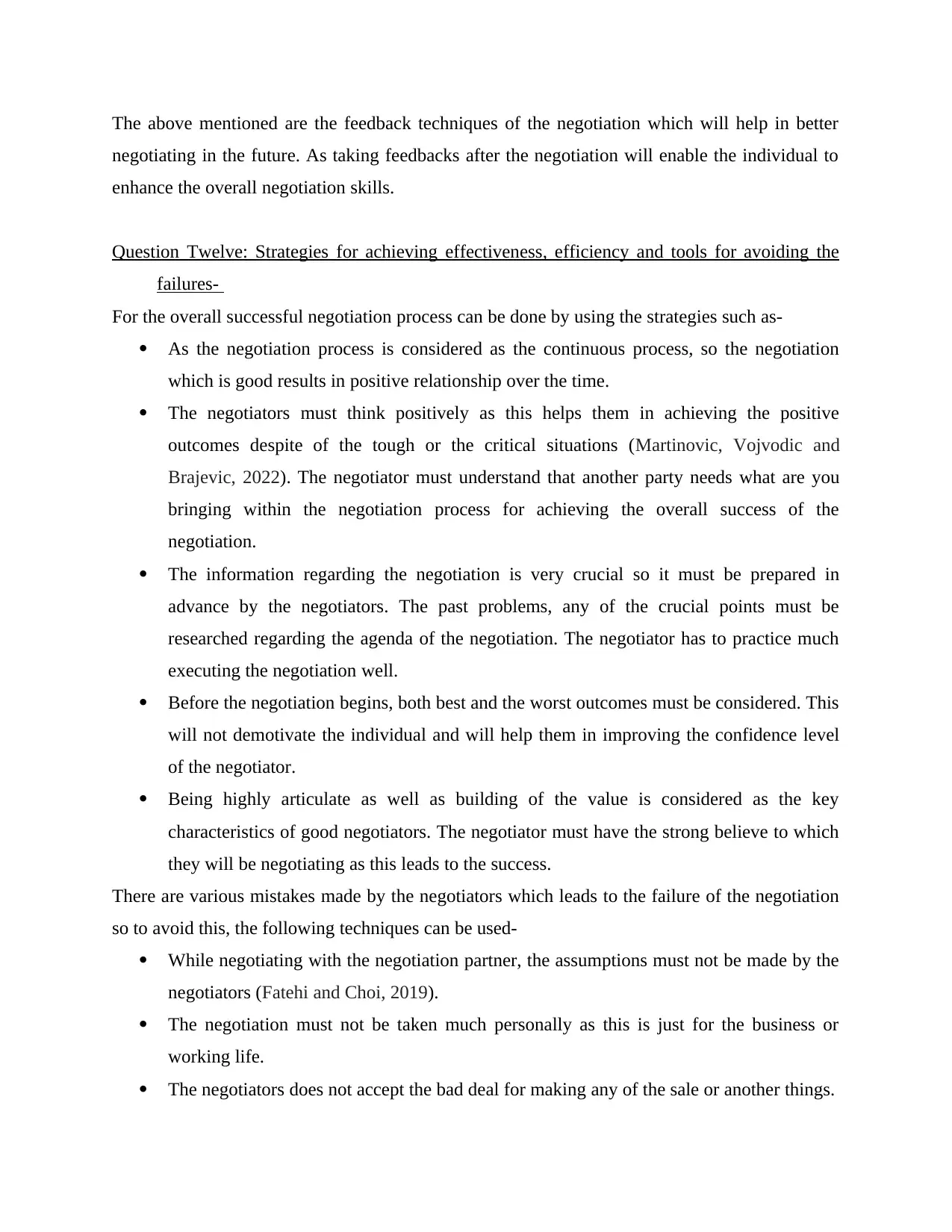
The above mentioned are the feedback techniques of the negotiation which will help in better
negotiating in the future. As taking feedbacks after the negotiation will enable the individual to
enhance the overall negotiation skills.
Question Twelve: Strategies for achieving effectiveness, efficiency and tools for avoiding the
failures-
For the overall successful negotiation process can be done by using the strategies such as-
As the negotiation process is considered as the continuous process, so the negotiation
which is good results in positive relationship over the time.
The negotiators must think positively as this helps them in achieving the positive
outcomes despite of the tough or the critical situations (Martinovic, Vojvodic and
Brajevic, 2022). The negotiator must understand that another party needs what are you
bringing within the negotiation process for achieving the overall success of the
negotiation.
The information regarding the negotiation is very crucial so it must be prepared in
advance by the negotiators. The past problems, any of the crucial points must be
researched regarding the agenda of the negotiation. The negotiator has to practice much
executing the negotiation well.
Before the negotiation begins, both best and the worst outcomes must be considered. This
will not demotivate the individual and will help them in improving the confidence level
of the negotiator.
Being highly articulate as well as building of the value is considered as the key
characteristics of good negotiators. The negotiator must have the strong believe to which
they will be negotiating as this leads to the success.
There are various mistakes made by the negotiators which leads to the failure of the negotiation
so to avoid this, the following techniques can be used-
While negotiating with the negotiation partner, the assumptions must not be made by the
negotiators (Fatehi and Choi, 2019).
The negotiation must not be taken much personally as this is just for the business or
working life.
The negotiators does not accept the bad deal for making any of the sale or another things.
negotiating in the future. As taking feedbacks after the negotiation will enable the individual to
enhance the overall negotiation skills.
Question Twelve: Strategies for achieving effectiveness, efficiency and tools for avoiding the
failures-
For the overall successful negotiation process can be done by using the strategies such as-
As the negotiation process is considered as the continuous process, so the negotiation
which is good results in positive relationship over the time.
The negotiators must think positively as this helps them in achieving the positive
outcomes despite of the tough or the critical situations (Martinovic, Vojvodic and
Brajevic, 2022). The negotiator must understand that another party needs what are you
bringing within the negotiation process for achieving the overall success of the
negotiation.
The information regarding the negotiation is very crucial so it must be prepared in
advance by the negotiators. The past problems, any of the crucial points must be
researched regarding the agenda of the negotiation. The negotiator has to practice much
executing the negotiation well.
Before the negotiation begins, both best and the worst outcomes must be considered. This
will not demotivate the individual and will help them in improving the confidence level
of the negotiator.
Being highly articulate as well as building of the value is considered as the key
characteristics of good negotiators. The negotiator must have the strong believe to which
they will be negotiating as this leads to the success.
There are various mistakes made by the negotiators which leads to the failure of the negotiation
so to avoid this, the following techniques can be used-
While negotiating with the negotiation partner, the assumptions must not be made by the
negotiators (Fatehi and Choi, 2019).
The negotiation must not be taken much personally as this is just for the business or
working life.
The negotiators does not accept the bad deal for making any of the sale or another things.
Paraphrase This Document
Need a fresh take? Get an instant paraphrase of this document with our AI Paraphraser
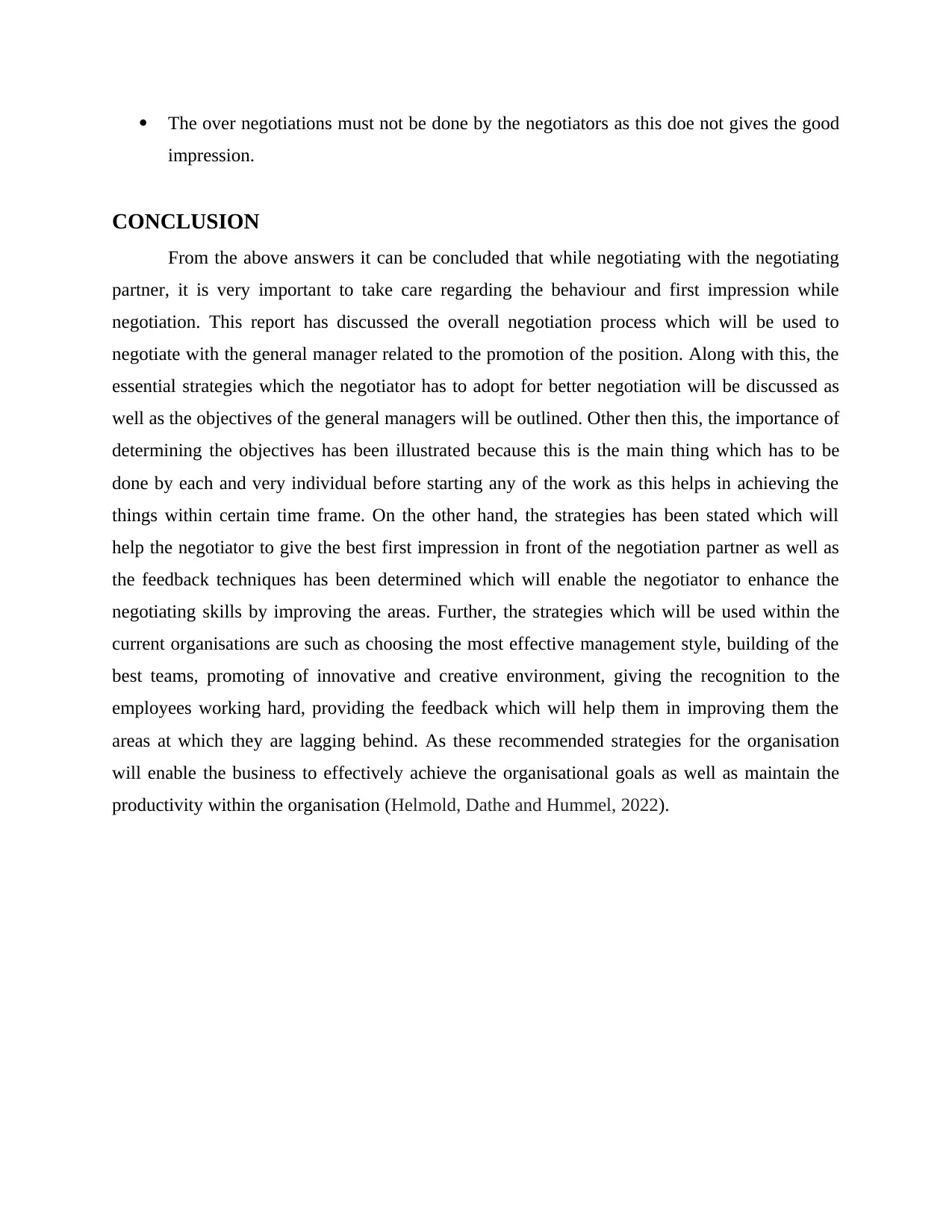
The over negotiations must not be done by the negotiators as this doe not gives the good
impression.
CONCLUSION
From the above answers it can be concluded that while negotiating with the negotiating
partner, it is very important to take care regarding the behaviour and first impression while
negotiation. This report has discussed the overall negotiation process which will be used to
negotiate with the general manager related to the promotion of the position. Along with this, the
essential strategies which the negotiator has to adopt for better negotiation will be discussed as
well as the objectives of the general managers will be outlined. Other then this, the importance of
determining the objectives has been illustrated because this is the main thing which has to be
done by each and very individual before starting any of the work as this helps in achieving the
things within certain time frame. On the other hand, the strategies has been stated which will
help the negotiator to give the best first impression in front of the negotiation partner as well as
the feedback techniques has been determined which will enable the negotiator to enhance the
negotiating skills by improving the areas. Further, the strategies which will be used within the
current organisations are such as choosing the most effective management style, building of the
best teams, promoting of innovative and creative environment, giving the recognition to the
employees working hard, providing the feedback which will help them in improving them the
areas at which they are lagging behind. As these recommended strategies for the organisation
will enable the business to effectively achieve the organisational goals as well as maintain the
productivity within the organisation (Helmold, Dathe and Hummel, 2022).
impression.
CONCLUSION
From the above answers it can be concluded that while negotiating with the negotiating
partner, it is very important to take care regarding the behaviour and first impression while
negotiation. This report has discussed the overall negotiation process which will be used to
negotiate with the general manager related to the promotion of the position. Along with this, the
essential strategies which the negotiator has to adopt for better negotiation will be discussed as
well as the objectives of the general managers will be outlined. Other then this, the importance of
determining the objectives has been illustrated because this is the main thing which has to be
done by each and very individual before starting any of the work as this helps in achieving the
things within certain time frame. On the other hand, the strategies has been stated which will
help the negotiator to give the best first impression in front of the negotiation partner as well as
the feedback techniques has been determined which will enable the negotiator to enhance the
negotiating skills by improving the areas. Further, the strategies which will be used within the
current organisations are such as choosing the most effective management style, building of the
best teams, promoting of innovative and creative environment, giving the recognition to the
employees working hard, providing the feedback which will help them in improving them the
areas at which they are lagging behind. As these recommended strategies for the organisation
will enable the business to effectively achieve the organisational goals as well as maintain the
productivity within the organisation (Helmold, Dathe and Hummel, 2022).
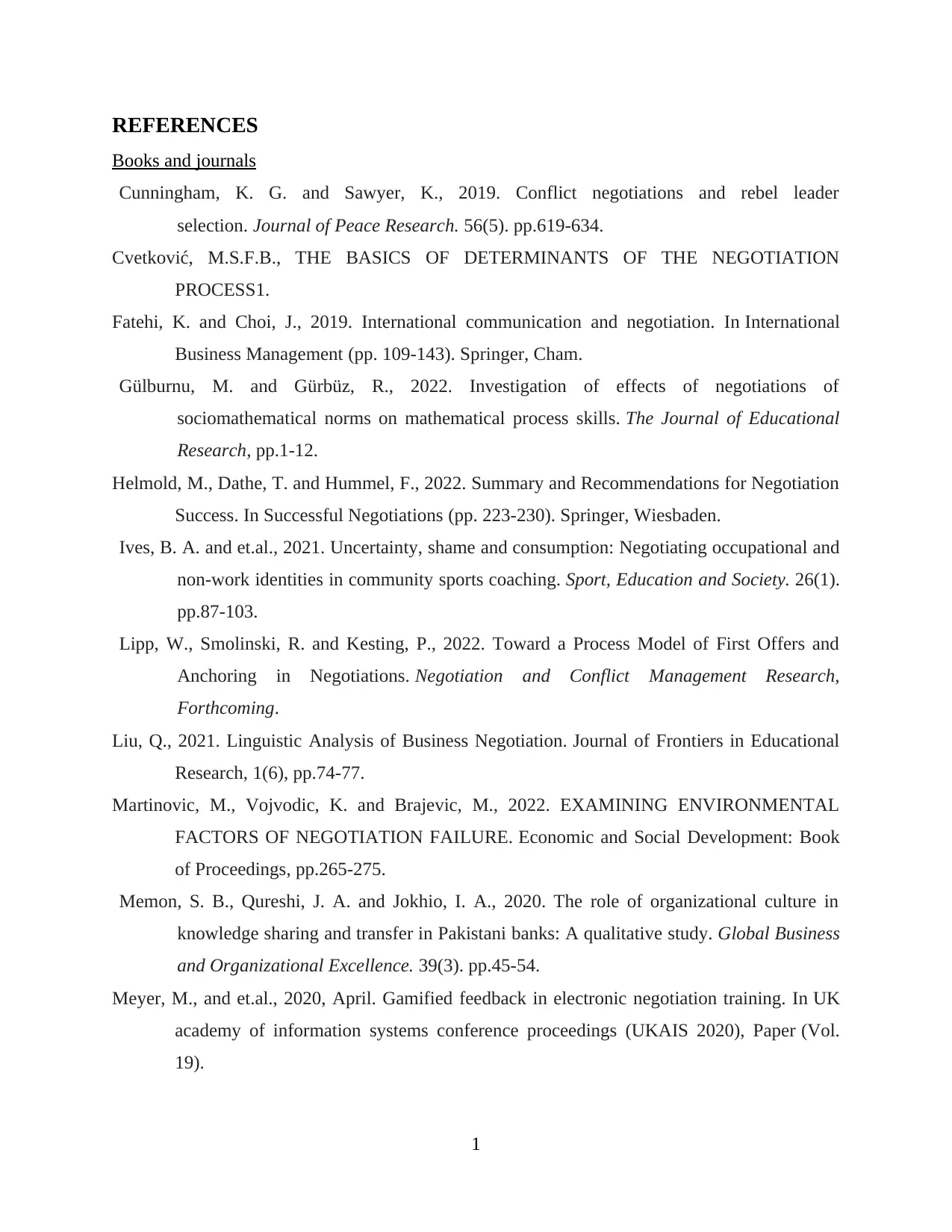
REFERENCES
Books and journals
Cunningham, K. G. and Sawyer, K., 2019. Conflict negotiations and rebel leader
selection. Journal of Peace Research. 56(5). pp.619-634.
Cvetković, M.S.F.B., THE BASICS OF DETERMINANTS OF THE NEGOTIATION
PROCESS1.
Fatehi, K. and Choi, J., 2019. International communication and negotiation. In International
Business Management (pp. 109-143). Springer, Cham.
Gülburnu, M. and Gürbüz, R., 2022. Investigation of effects of negotiations of
sociomathematical norms on mathematical process skills. The Journal of Educational
Research, pp.1-12.
Helmold, M., Dathe, T. and Hummel, F., 2022. Summary and Recommendations for Negotiation
Success. In Successful Negotiations (pp. 223-230). Springer, Wiesbaden.
Ives, B. A. and et.al., 2021. Uncertainty, shame and consumption: Negotiating occupational and
non-work identities in community sports coaching. Sport, Education and Society. 26(1).
pp.87-103.
Lipp, W., Smolinski, R. and Kesting, P., 2022. Toward a Process Model of First Offers and
Anchoring in Negotiations. Negotiation and Conflict Management Research,
Forthcoming.
Liu, Q., 2021. Linguistic Analysis of Business Negotiation. Journal of Frontiers in Educational
Research, 1(6), pp.74-77.
Martinovic, M., Vojvodic, K. and Brajevic, M., 2022. EXAMINING ENVIRONMENTAL
FACTORS OF NEGOTIATION FAILURE. Economic and Social Development: Book
of Proceedings, pp.265-275.
Memon, S. B., Qureshi, J. A. and Jokhio, I. A., 2020. The role of organizational culture in
knowledge sharing and transfer in Pakistani banks: A qualitative study. Global Business
and Organizational Excellence. 39(3). pp.45-54.
Meyer, M., and et.al., 2020, April. Gamified feedback in electronic negotiation training. In UK
academy of information systems conference proceedings (UKAIS 2020), Paper (Vol.
19).
1
Books and journals
Cunningham, K. G. and Sawyer, K., 2019. Conflict negotiations and rebel leader
selection. Journal of Peace Research. 56(5). pp.619-634.
Cvetković, M.S.F.B., THE BASICS OF DETERMINANTS OF THE NEGOTIATION
PROCESS1.
Fatehi, K. and Choi, J., 2019. International communication and negotiation. In International
Business Management (pp. 109-143). Springer, Cham.
Gülburnu, M. and Gürbüz, R., 2022. Investigation of effects of negotiations of
sociomathematical norms on mathematical process skills. The Journal of Educational
Research, pp.1-12.
Helmold, M., Dathe, T. and Hummel, F., 2022. Summary and Recommendations for Negotiation
Success. In Successful Negotiations (pp. 223-230). Springer, Wiesbaden.
Ives, B. A. and et.al., 2021. Uncertainty, shame and consumption: Negotiating occupational and
non-work identities in community sports coaching. Sport, Education and Society. 26(1).
pp.87-103.
Lipp, W., Smolinski, R. and Kesting, P., 2022. Toward a Process Model of First Offers and
Anchoring in Negotiations. Negotiation and Conflict Management Research,
Forthcoming.
Liu, Q., 2021. Linguistic Analysis of Business Negotiation. Journal of Frontiers in Educational
Research, 1(6), pp.74-77.
Martinovic, M., Vojvodic, K. and Brajevic, M., 2022. EXAMINING ENVIRONMENTAL
FACTORS OF NEGOTIATION FAILURE. Economic and Social Development: Book
of Proceedings, pp.265-275.
Memon, S. B., Qureshi, J. A. and Jokhio, I. A., 2020. The role of organizational culture in
knowledge sharing and transfer in Pakistani banks: A qualitative study. Global Business
and Organizational Excellence. 39(3). pp.45-54.
Meyer, M., and et.al., 2020, April. Gamified feedback in electronic negotiation training. In UK
academy of information systems conference proceedings (UKAIS 2020), Paper (Vol.
19).
1
⊘ This is a preview!⊘
Do you want full access?
Subscribe today to unlock all pages.

Trusted by 1+ million students worldwide
1 out of 13
Related Documents
Your All-in-One AI-Powered Toolkit for Academic Success.
+13062052269
info@desklib.com
Available 24*7 on WhatsApp / Email
![[object Object]](/_next/static/media/star-bottom.7253800d.svg)
Unlock your academic potential
Copyright © 2020–2026 A2Z Services. All Rights Reserved. Developed and managed by ZUCOL.



